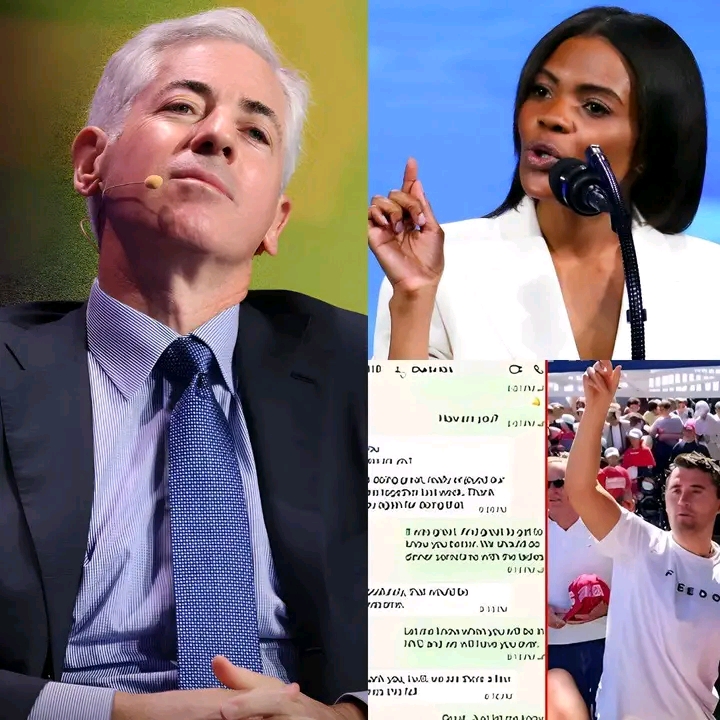NFL
“You think you can silence me?” — Candace Owens fires back, leaving Bill Ackman fuming — Leaked messages with Charlie Kirk the public was never meant to see — and what was revealed in the final 12 seconds is beyond imagination. Candace Owens just hit back at Bill Ackman right in the middle of the storm, as leaked messages between her and Charlie Kirk began to spread across social media. She didn’t hide. She didn’t apologize. And she certainly didn’t stay silent. In the final 12 seconds of the recording, an unexpected detail left the entire boardroom frozen in absolute silence. They said she crossed the line — but what is the line when the truth itself is being twisted, message by message? What made billionaire Bill Ackman lose his composure and walk out mid-meeting?

In a stunning turn of events that has rocked social media, Candace Owens has taken a bold stand in the face of one of the most unexpected challenges of her career. What began as a simple dispute over messaging strategies soon escalated into a public spectacle, leaving billionaire investor
Bill Ackman visibly frustrated and, ultimately, walking out of a high-profile boardroom meeting in disbelief. At the center of this storm: leaked private messages between Owens and conservative commentator Charlie Kirk, which are now circulating widely online.
The public, until now, had never been privy to these messages. They contain candid, unfiltered exchanges that shed light on behind-the-scenes dynamics few could have anticipated.
Yet the most shocking moment—the one that left everyone in the room frozen—came in the final twelve seconds of a recording from the meeting itself. The content of those twelve seconds has ignited debates, fueled speculation, and prompted intense discussions across forums, news outlets, and social media platforms.
Candace Owens has long been known for her fearless approach to politics and social commentary. She built her platform by speaking unapologetically and challenging narratives that she views as misleading or false. In this particular incident, her trademark boldness became a lightning rod for controversy.
During the meeting with Ackman, Owens was confronted with pointed questions and ultimatums, largely centered on the content of her private messages with Charlie Kirk. According to multiple sources familiar with the event, Ackman was seeking reassurance that Owens’ communications aligned with broader messaging strategies—particularly in contexts where public perception could impact investments or philanthropic initiatives he was involved in.
But Owens refused to be cornered. At one point in the discussion, she leaned forward, her tone sharp but controlled, and delivered a statement that would soon make headlines: “You think you can silence me?”
This single line, brimming with defiance, was met with stunned silence in the room. Some colleagues whispered in disbelief, while others simply sat frozen, unsure how to respond.
Her words were not mere rhetoric. They were emblematic of a deeper principle she has consistently championed: the right to speak truth, even when it challenges those in positions of power. Owens’ stance raised fundamental questions: When private messages are leaked, who controls the narrative? And, more importantly, when the truth is distorted, what constitutes crossing a line?
The messages between Owens and Kirk reveal an intricate web of professional collaboration, strategic planning, and personal insights that were never intended for public consumption.
Far from the simplified narratives circulated online, these conversations show a sophisticated, high-stakes dialogue between two influential figures navigating the complexities of public engagement, media scrutiny, and political strategy.
Some excerpts from the messages indicate brainstorming sessions on messaging tactics, public statements, and approaches to sensitive topics. Other parts reveal candid discussions about challenges in coordinating high-profile initiatives and the pressures of maintaining credibility under intense scrutiny.
In many ways, these messages underscore a fundamental tension in modern public life: the private strategies that guide public personas versus the public’s desire for transparency.
Once leaked, even innocent conversations can be interpreted as controversial or alarming, leading to dramatic consequences, as was the case in this boardroom confrontation.
According to multiple attendees, the meeting began like many others—professionals gathered to discuss organizational priorities, messaging strategies, and collaborative opportunities. However, the dynamic shifted dramatically when Ackman, visibly tense, raised concerns about the implications of Owens’ communications











